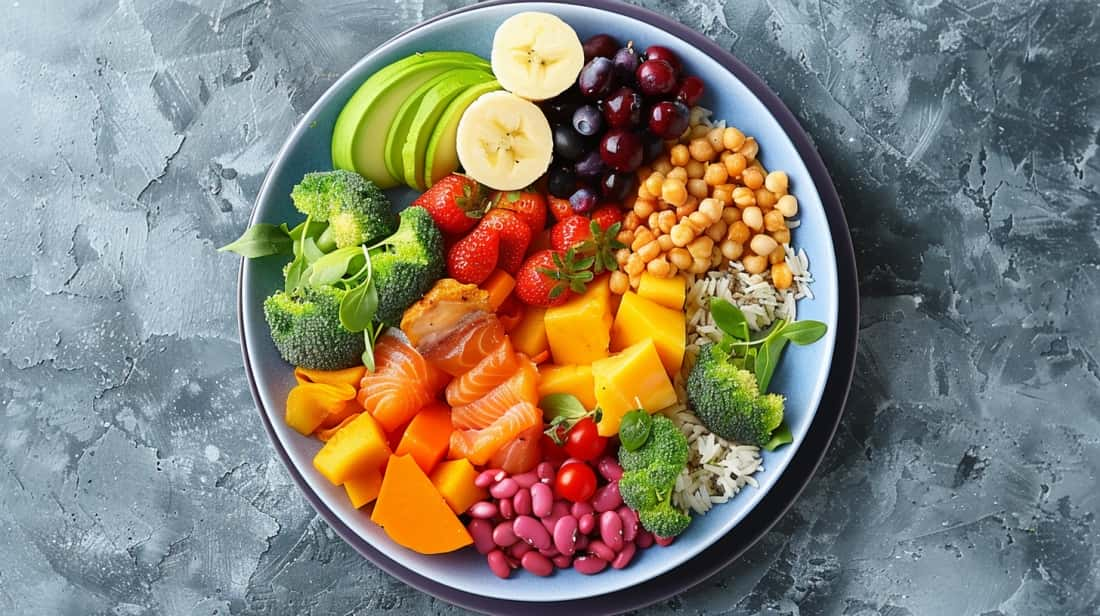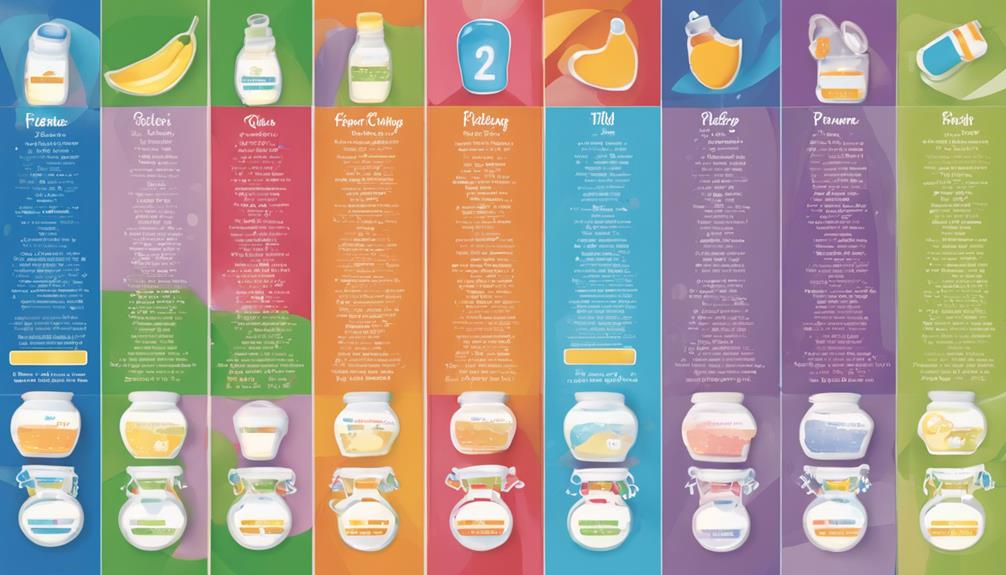As we navigate the intricate garden of a healthy breastfeeding diet, let's shed light on the top 10 eczema-friendly foods awaiting our exploration.
Each bite can be a stepping stone towards nurturing not just ourselves but also our little ones.
So, have you ever wondered how these foods could potentially transform your breastfeeding journey and support your baby's skin health in a unique way?
Key Takeaways
- Omega-3 Rich Foods like flaxseeds reduce inflammation and improve skin health for eczema management.
- Probiotic-Rich Foods support gut health and immune function, potentially reducing eczema-related inflammation.
- Lean Protein Sources aid in skin repair and maintenance, benefiting both mother and baby during breastfeeding.
- Zinc-Rich Foods promote collagen production, reduce inflammation, and support overall skin health for eczema relief.

Viva Naturals Organic Ground Flaxseed, 30 oz (850 g) – Plant-Based Protein, Vegan Omega-3 & Fiber, Finely Milled Flax Seeds, Perfect for Smoothies & Baking
✔️ GROUND FLAXSEED ORGANIC — Our finely ground flaxseed is sourced from the golden fields of the great…
As an affiliate, we earn on qualifying purchases.
As an affiliate, we earn on qualifying purchases.
Omega-3 Rich Foods
Incorporating omega-3 rich foods into a breastfeeding diet can effectively alleviate inflammation and enhance skin health for mothers managing eczema. Omega-3 fatty acids, such as those found in flaxseeds, play a vital role in reducing the inflammatory processes associated with eczema. Research indicates that these essential fatty acids not only help in managing eczema symptoms but also contribute to overall skin health. Flaxseeds, being a plant-based source of omega-3 fatty acids, are particularly beneficial for breastfeeding mothers dealing with eczema, offering a natural and safe way to improve skin conditions.
Including flaxseeds and other omega-3 rich foods in your daily meals can aid in strengthening the skin barrier, potentially lowering the risk of eczema flare-ups. By incorporating these nutrient-dense foods into your diet, you can support skin hydration, promote healing, and enhance the management of eczema symptoms while providing essential nutrients for both you and your baby.

Activia Probiotic Dailies Strawberry Low Fat Yogurt Drinks, Delicious Daily Probiotic Yogurt Drinks to Help Support Gut Health, 3.1 fl oz, 8 count
Deliciously Good, Backed by Science: Pack of eight 3.1 fl oz bottles of Activia Probiotic Dailies Strawberry Low…
As an affiliate, we earn on qualifying purchases.
As an affiliate, we earn on qualifying purchases.
Leafy Green Vegetables

Leafy green vegetables like spinach, kale, and Swiss chard offer a powerhouse of vitamins and antioxidants essential for promoting skin health and combating inflammation associated with eczema. These veggies are rich in vitamins A, C, and E, which support skin health and repair, along with antioxidants that help reduce inflammation linked to eczema. Additionally, the high fiber content in leafy greens promotes gut health, vital for immune function and eczema management. Minerals like magnesium and zinc found in these greens play a role in skin healing and maintenance. Including a variety of leafy green vegetables in your diet can provide a range of nutrients beneficial for managing eczema symptoms.
| Nutrient | Benefits |
|---|---|
| Vitamins A, C, E | Support skin health and repair |
| Antioxidants | Reduce inflammation and oxidative stress |
| Fiber | Promotes gut health for immune function |
| Minerals (Mg, Zn) | Aid in skin healing and maintenance |

Nature’s Bounty Zinc 50mg, Immune Support & Antioxidant Supplement, Promotes Skin Health, 1 Caplet Per Day, Gluten Free, 250 Vegetarian Caplets
POTENT IMMUNE SUPPORT (1): Zinc is a trace element that plays a vital role in immune support. (1)…
As an affiliate, we earn on qualifying purchases.
As an affiliate, we earn on qualifying purchases.
Probiotic-Rich Foods
Probiotic-rich foods play an important role in supporting gut health and bolstering the immune system, which can have positive effects on eczema.
Sources like yogurt, kefir, and miso offer a variety of probiotic strains essential for maintaining a healthy balance in the gut.
Including a range of probiotic-rich foods in our diet while breastfeeding may contribute to reducing inflammation linked to eczema and promoting overall skin health.
Gut Health Benefits
Including yogurt, kefir, or miso soup in our diet during breastfeeding can support a healthy gut flora, essential for immune function and reducing the risk of eczema in infants. Probiotic-rich foods aid in digestion, nutrient absorption, and potentially benefit both mother and baby.
Studies suggest that probiotics may decrease allergic conditions like eczema in breastfed infants. By consuming these foods, we can promote a diverse and beneficial gut microbiota for ourselves and our babies. Additionally, probiotic supplements can be beneficial for the immune system during breastfeeding.
Prioritizing probiotic-rich foods in our diet while breastfeeding can play a significant role in maintaining gut health and potentially influencing the development of eczema in our little ones.
Sources and Variety
When incorporating probiotic-rich foods into a breastfeeding diet, a diverse selection of sources and varieties can be beneficial for supporting gut health and potentially reducing the risk of eczema in infants. Foods like yogurt, kefir, and miso contain beneficial bacteria that aid in reducing inflammation associated with eczema symptoms.
Including these probiotic-rich options can enhance the diversity of beneficial bacteria in breast milk, positively impacting the baby's developing immune system. Research indicates that the probiotics from a mother's diet may influence the composition of breast milk, potentially lowering the infant's likelihood of developing eczema.

Carlyle Super Greens Capsules | 250 Count | Blend of 13 Vegetables and Greens Plus 17 Fruits | Non-GMO & Gluten Free Supplement
SUPER GREENS: Now you can receive 30 vegetables, fruits, and greens in one convenient formula!
As an affiliate, we earn on qualifying purchases.
As an affiliate, we earn on qualifying purchases.
Antioxidant-Packed Berries
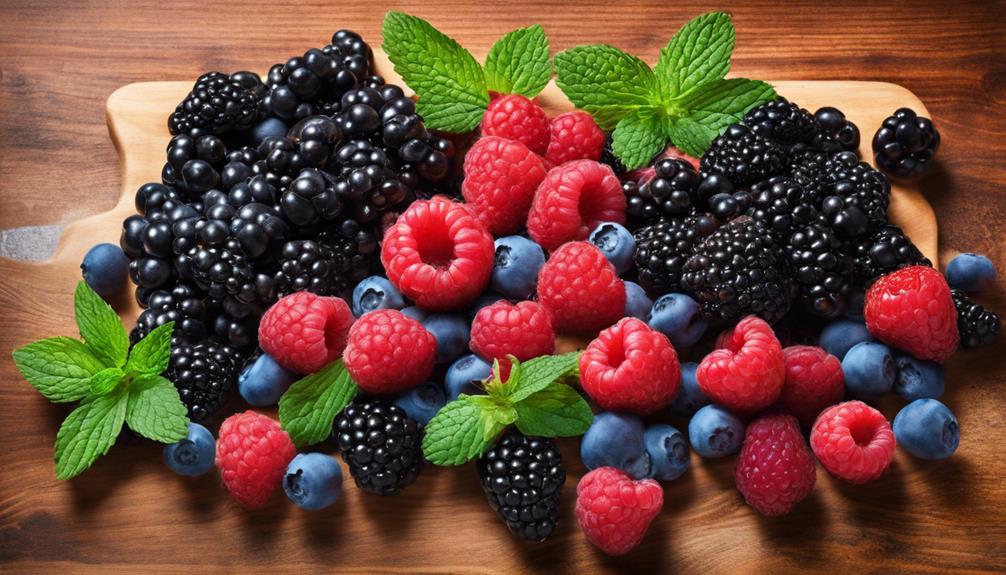
Berries such as blueberries, strawberries, and raspberries are renowned for their rich antioxidant content, which plays a pivotal role in reducing inflammation associated with eczema. Antioxidants found in these fruits protect skin cells from damage, promoting overall skin health and potentially decreasing eczema flare-ups.
The high levels of vitamin C present in berries are beneficial for collagen production, aiding in skin repair and alleviating eczema symptoms. Additionally, berries contain flavonoids that have been shown to enhance skin barrier function, thereby helping to address eczema-related skin issues effectively.
By incorporating a variety of berries into your diet, you can benefit from a range of antioxidants that support skin healing. This diverse antioxidant profile can be particularly advantageous for individuals struggling with eczema, as it aids in skin repair and maintenance.
Including antioxidant-packed berries in your diet can be a delicious and beneficial way to support your skin health and manage eczema symptoms efficiently.
Lean Protein Sources
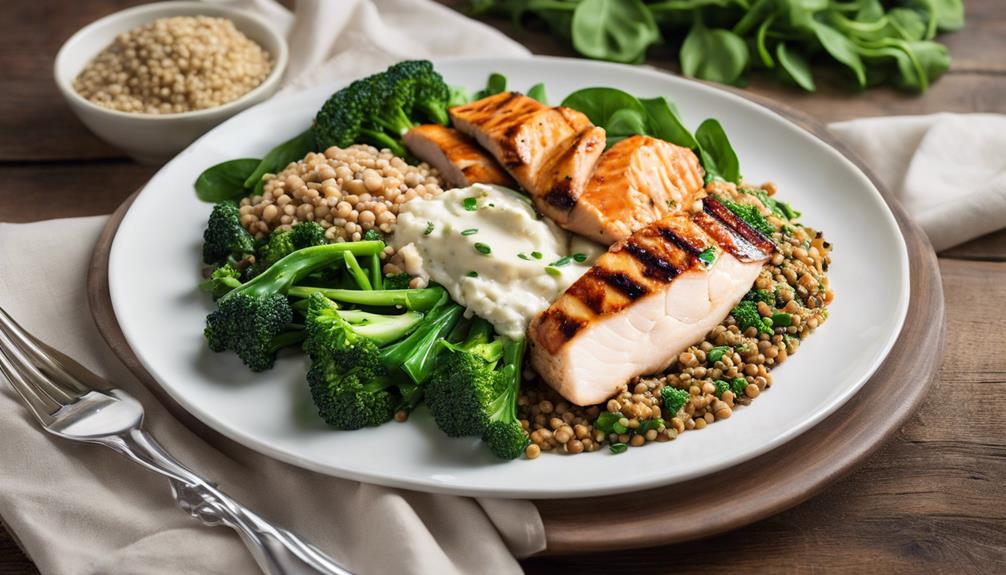
Lean protein sources such as chicken, turkey, and fish are important for providing essential amino acids necessary for skin repair and maintenance.
Including lean proteins in our diet can support our overall health as breastfeeding mothers.
These options are low in saturated fats, making them heart-healthy choices for lactating women.
Benefits of Lean Protein
Incorporating lean protein sources such as chicken, turkey, and fish into a breastfeeding diet supports skin health by providing essential amino acids important for repair and maintenance. These proteins play a vital role in improving skin condition, potentially reducing eczema symptoms.
By opting for lean protein options, breastfeeding mothers can benefit from lower saturated fats, promoting heart health. Additionally, lean meats aid in maintaining muscle mass, supporting postpartum recovery. Making choices that favor lean proteins over fatty cuts can also assist in managing cholesterol levels and promoting weight control.
Including these protein-rich foods in your diet can't only benefit your skin but also contribute to your overall well-being during breastfeeding.
Best Protein Sources
To optimize skin health and overall well-being during breastfeeding, focusing on the best protein sources such as skinless chicken, turkey, and fish is essential. Lean protein sources are crucial for a healthy breastfeeding diet as they are low in saturated fats and provide essential nutrients for both the mother and the baby. Incorporating lean protein into meals supports muscle repair, aids in weight management, and promotes a feeling of fullness. Here are some excellent lean protein sources to include in your breastfeeding diet:
| Protein Source | Benefits |
|---|---|
| Skinless Chicken | High in protein and low in fat |
| Turkey | Rich in nutrients like iron and zinc |
| Fish | Provides omega-3 fatty acids for brain development |
Protein-Rich Meal Ideas
For best skin health and overall well-being during breastfeeding, we can explore creative meal ideas rich in protein from sources like skinless poultry, fish, tofu, and legumes. Including these protein-rich foods in our diet can support collagen production, aiding in skin repair and maintenance. Additionally, consuming lean protein helps maintain muscle mass and promotes postpartum recovery.
Here are some delicious lean protein meal ideas to enhance skin health:
- Grilled chicken breast with a side of quinoa and roasted vegetables
- Baked salmon served with a kale and chickpea salad
- Stir-fried tofu with broccoli and brown rice
These protein-packed meals not only benefit our skin but also provide essential nutrients for best breastfeeding health and overall well-being.
Zinc-Rich Foods

Zinc-rich foods play an important role in supporting skin health and aiding in wound healing, essential for individuals managing eczema through breastfeeding. Including sources like beef, poultry, and seafood in your diet can provide the necessary zinc levels needed for best skin integrity.
Plant-based options such as pumpkin seeds and chickpeas also offer a vegan-friendly approach to meeting your zinc requirements. Zinc is essential for collagen production, cellular repair, and reducing inflammation linked to eczema flare-ups.
Maintaining adequate zinc levels is key as a deficiency can compromise immune function and skin barrier integrity, potentially exacerbating eczema symptoms. By incorporating zinc-rich foods into your breastfeeding diet, you can promote overall skin health and support the management of eczema.
Vitamin D-Fortified Foods
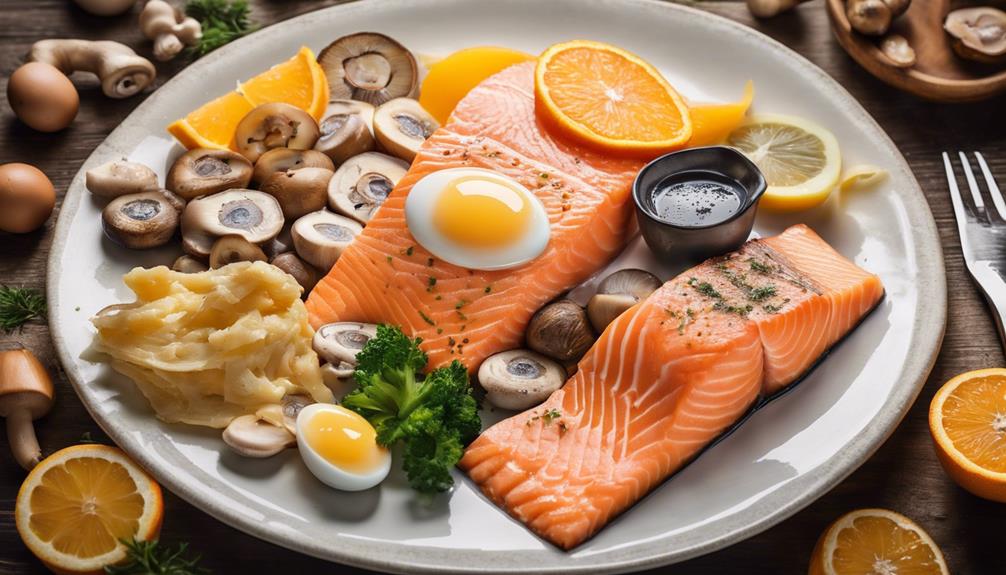
Ensuring an adequate intake of vitamin D-fortified foods is essential for breastfeeding mothers to meet their daily vitamin D needs and support both their own and their baby's bone health and immune function. Fortified milk, yogurt, and orange juice are excellent sources of vitamin D that can help fulfill these requirements.
As breastfeeding mothers, we comprehend the importance of providing our bodies with the necessary nutrients to support not only our well-being but also that of our little ones.
- Fortified milk: A comforting glass of fortified milk not only nourishes us but also guarantees we're meeting our vitamin D needs for optimal health.
- Yogurt: Incorporating vitamin D-fortified yogurt into our diet can be a delicious way to support our bone health and immune function during this critical time.
- Orange juice: Starting the day with a glass of vitamin D-fortified orange juice not only refreshes us but also contributes to our overall well-being and that of our baby.
Whole Grains and Fiber
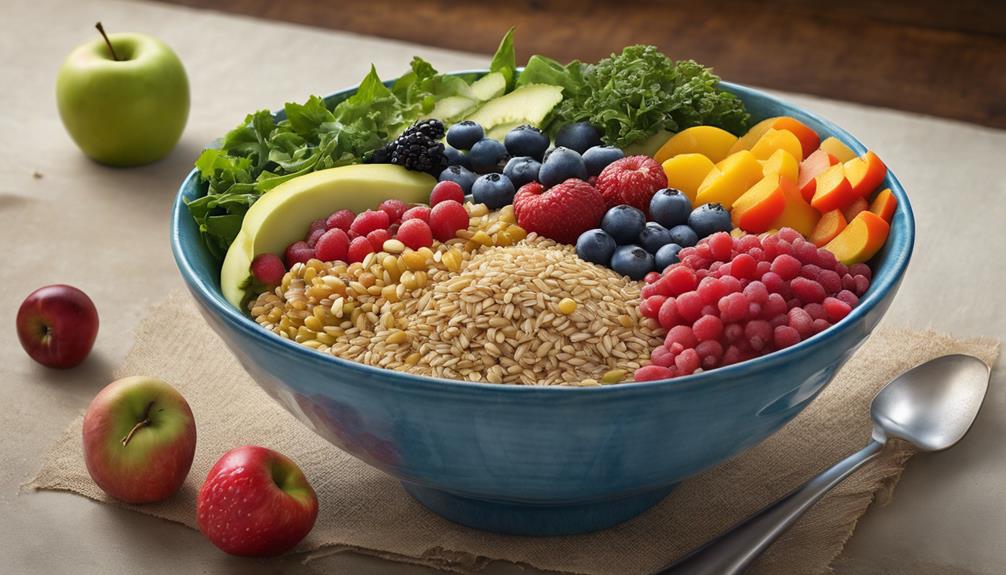
Incorporating whole grains like oats, quinoa, and brown rice into our diet can greatly enhance gut health and overall well-being. These whole grains are essential components of an eczema-friendly diet for breastfeeding mothers. Rich in fiber, they aid digestion, promote satiety, and contribute to maintaining a healthy weight, which is beneficial during the postpartum period. Additionally, whole grains offer important nutrients such as B vitamins, iron, and magnesium, important for sustaining energy levels and aiding in postpartum recovery.
Furthermore, the fiber content in whole grains helps stabilize blood sugar levels, reducing energy crashes and providing sustained energy necessary for breastfeeding. By choosing whole grains over refined grains, mothers can elevate the nutritional value of their diet, gaining access to a broader range of vitamins, minerals, and antioxidants. Including whole grains in daily meals is a simple yet effective way to support both maternal health and the well-being of the breastfeeding baby.
Coconut Oil and Avocado

Coconut oil and avocado offer notable benefits for individuals dealing with eczema.
Coconut oil's lauric acid possesses antimicrobial and anti-inflammatory properties that can aid in managing eczema symptoms.
Avocado, rich in monounsaturated fats and vitamin E, promotes skin hydration and reduces inflammation, making it a valuable addition to an eczema-friendly diet.
Skin Benefits of Coconut
To promote healthy skin and alleviate eczema symptoms, incorporating coconut oil and avocado into your diet or skincare routine can provide significant skin benefits. Coconut oil is rich in fatty acids that can improve skin hydration and reduce inflammation, making it beneficial for eczema-prone skin. Here are some reasons why coconut oil is a great addition to your skincare routine:
- The antimicrobial properties of lauric acid in coconut oil can help combat skin infections associated with eczema.
- Coconut oil supports overall skin health by providing essential hydration and reducing inflammation.
- Incorporating coconut oil into your diet can also contribute to the management of eczema symptoms.
Nutrient-Rich Avocado Properties
Avocado's nutrient-rich properties make it a valuable addition to a breastfeeding diet, offering benefits for both skin health and overall wellness. Rich in monounsaturated fats, avocados help maintain skin health and reduce inflammation, making them beneficial for eczema sufferers. The high vitamin E content in avocados promotes skin repair and protection, aiding in managing eczema symptoms effectively.
Additionally, avocados are a good source of antioxidants like lutein and zeaxanthin, which combat oxidative stress and inflammation in the body. Avocado oil, derived from avocados, is commonly used topically to soothe and moisturize dry, itchy skin associated with eczema. Including avocados in a breastfeeding diet provides essential nutrients for both mother and baby, supporting overall health and skin wellness.
Hydrating Foods and Herbal Teas

Incorporating hydrating foods and herbal teas into a breastfeeding diet can support skin health and overall well-being, benefiting eczema-prone individuals.
Hydrating foods like watermelon, cucumbers, and celery can help maintain skin hydration, potentially reducing dryness and irritation common in eczema. Additionally, herbal teas like chamomile and rooibos offer soothing and hydrating properties that can promote skin health, providing a relaxing way to stay hydrated while breastfeeding.
Hydration plays an essential role in skin health, and these foods and teas can contribute to preventing skin issues, making them valuable additions to a breastfeeding diet. By including these hydrating options, breastfeeding mothers can nourish their skin from within, potentially alleviating eczema symptoms and supporting overall skin wellness.
Frequently Asked Questions
What Foods Should Breastfeeding Babies With Eczema Avoid?
We should avoid dairy, eggs, citrus fruits, processed sugary snacks, peanuts, tree nuts, shellfish, soy, and fish for breastfeeding babies with eczema. These foods can trigger allergic reactions, worsen symptoms, and contribute to skin irritation.
What Foods Help Clear up Eczema?
We find that incorporating omega-3 fatty acids, probiotics, and antioxidants into our diet can help alleviate eczema symptoms. Foods like salmon, yogurt, and blueberries have been shown to reduce inflammation and support healthy skin, making a noticeable difference.
What Are the Healthiest Foods for Breastfeeding Moms?
We prioritize the healthiest foods for breastfeeding moms. Salmon, flaxseeds, yogurt, blueberries, oranges, bell peppers, whole grains, lean proteins, and leafy greens offer essential nutrients. These foods support skin health, reduce inflammation, boost immunity, and aid in overall well-being.
What Foods Help Eczema Go Away in Babies?
To help eczema go away in babies, we focus on foods rich in omega-3s, probiotics, and antioxidants. Including salmon, yogurt, and blueberries in our diet can reduce inflammation and promote skin health for our little ones.
Conclusion
Just like a well-tended garden yields beautiful blooms, nourishing your body with eczema-friendly foods during breastfeeding cultivates healthy skin for your little one.
By sowing the seeds of omega-3 rich foods, probiotics, and antioxidant-packed berries, you're providing the ultimate environment for skin health to flourish.
Remember, a healthy diet is the fertile soil from which radiant skin blossoms, so tend to your body with care and watch your baby thrive.
